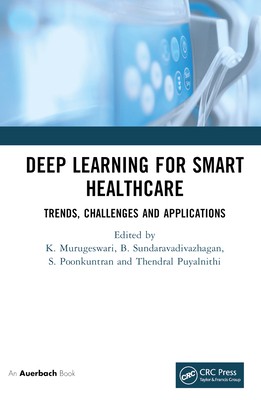
- We will send in 10–14 business days.
- Publisher: Auerbach Publications
- ISBN-10: 1032455810
- ISBN-13: 9781032455815
- Format: 15.6 x 23.4 x 1.9 cm, kieti viršeliai
- Language: English
- SAVE -10% with code: EXTRA
Deep Learning for Smart Healthcare (e-book) (used book) | bookbook.eu
Reviews
Description
Deep Learning can provide more accurate results compare to machine learning. It uses layered algorithmic architecture to analyse data. It produces more accurate results since leaning from previous results to enhance its ability. The multi-layered nature of deep learning systems has the potential to classify subtle abnormalities in medical images, clustering patients with similar characteristics into risk-based cohorts, or highlighting relationships between symptoms and outcomes within vast quantities of unstructured data.
Exploring this potential, Deep Learning for Smart Healthcare: Trends, Challenges and Applications is a reference work for researchers and academicians who are seeking new ways to apply deep learning algorithms in healthcare, including medical imaging and healthcare data analytics. It covers how deep learning can analyses a patient's medical history efficiently to aid in recommending drugs and dosages. It discusses how deep learning can be applied to CT scans, MRI scans, and ECGs to diagnose diseases. Other deep learning applications explored are extending the scope of patient record management, pain assessment, new drug design, and managing the clinical trial process.
Bringing together a wide range of research domains, this book can help to develop breakthrough applications for improving healthcare management and patient outcomes.
EXTRA 10 % discount with code: EXTRA
The promotion ends in 21d.09:11:26
The discount code is valid when purchasing from 10 €. Discounts do not stack.
- Publisher: Auerbach Publications
- ISBN-10: 1032455810
- ISBN-13: 9781032455815
- Format: 15.6 x 23.4 x 1.9 cm, kieti viršeliai
- Language: English English
Deep Learning can provide more accurate results compare to machine learning. It uses layered algorithmic architecture to analyse data. It produces more accurate results since leaning from previous results to enhance its ability. The multi-layered nature of deep learning systems has the potential to classify subtle abnormalities in medical images, clustering patients with similar characteristics into risk-based cohorts, or highlighting relationships between symptoms and outcomes within vast quantities of unstructured data.
Exploring this potential, Deep Learning for Smart Healthcare: Trends, Challenges and Applications is a reference work for researchers and academicians who are seeking new ways to apply deep learning algorithms in healthcare, including medical imaging and healthcare data analytics. It covers how deep learning can analyses a patient's medical history efficiently to aid in recommending drugs and dosages. It discusses how deep learning can be applied to CT scans, MRI scans, and ECGs to diagnose diseases. Other deep learning applications explored are extending the scope of patient record management, pain assessment, new drug design, and managing the clinical trial process.
Bringing together a wide range of research domains, this book can help to develop breakthrough applications for improving healthcare management and patient outcomes.


Reviews